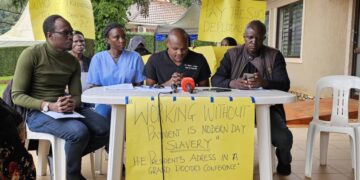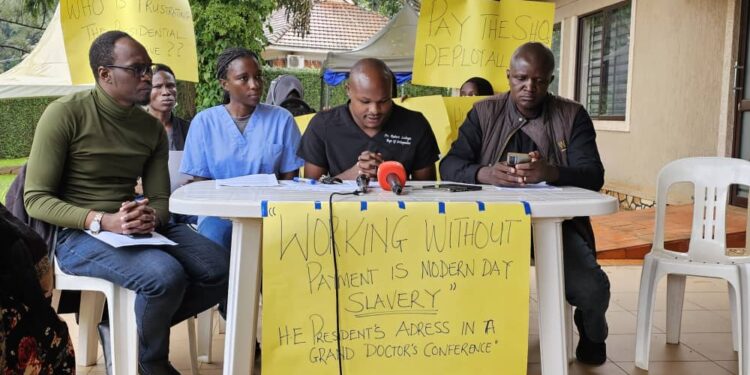Senior Health Officers and Medical Interns nationwide have resolved to reactivate their suspended industrial action.
They plan to lay down tools effective Labour Day on May 1, 2023.
Speaking at a press conference, the Medical officers cited the delayed deployment of the Medical Interns, delayed payment of Senior Health Officers’ (SHO) allowances since November 2022 for the First Years and January 2023 for some SHOS, and the Scrapping of Interns and SHO allowances with effect from the next Financial Year as a result of the Ministry of Health budgetary cut.
“The last payment of allowances was made in February 2023 to very few SHOS. About 150 in the First Years, a group of continuing SHOS and Clinical Fellows were left out. We are demanding 4 to 6 months’ allowance arrears! Yet they are expected to study diligently while serving their fellow Ugandans amidst challenges of scarcity of medical supplies,” they noted in a joint press statement.
“We have noted that it has become a habit for the First Year SHOS to miss allowances for the First 3 to 6 months! Most recently, in the current 2nd-year lot of SHOS based at Mbarara RRH missed their payment for the first 6 months without any explanation. We suspect, has someone been eating this money. Currently, the 1st Year SHOS based in Mulago NRH, Kiruddu and Kawempe RRHS have not received their allowances since they reported for work-study in October 2022 and those in Kabale RRH since August 2022. Uganda’s Health Budget is reducing every year, so the Ugandans’ health cannot be improved in the short and long term with these budget cuts.”
In their demands, they proposed that the Ministry of Health develops a policy for SHO/Interns Doctors’ training and deployment.
“In this policy. change the name of Medical Officer Special Grade to Associate Consultant. Provide for SHOs/Intern Doctors in the Public Service structure of staffing hospitals. Revise payment of Associate Consultant/ Medical Officer Special Grade to 10 million per month from 6 million,” arguing that this will ensure that their compensation is commensurate with their skills and expertise.
They also requested the immediate deployment of all medical interns to hospitals nationwide, explaining that this will alleviate the current shortage of Doctors in over the biggest 50 hospitals country-wide.
“This will also repair the broken chain of command in hospitals and the smooth training schedules to supply new Doctors into the labour market in the country, in East Africa and internationally,” the Doctors asked.
They further asked the government to pay SHOs their arrears for 4-6 months, noting, this will help SHO meet their basic needs as they continue providing essential medical care to Ugandans.
“This should be done without discrimination to promote fairness and equality among all SHOs and Clinical Fellows,” they noted.
Furthermore, they asked the government to halt all the budgetary cuts to the MOH that will affect access to critical services of blood, essential medicines and human resources.
However, in response, the Health Ministry Public Relations Officer, Emmanuel Ainebyoona, said the issue of SHOS, is being discussed at cabinet level and awaiting a final decision.
Senior House Officers (SHOS) and Clinical Fellows are qualified Senior Medical Doctors registered with the Uganda Medical and Dental Practitioners Council, and are undergoing Specialized training to become General, Orthopedic (bones), Ophthalmology (eye) surgeons, Pediatricians (child health), Cardiologists (heart disease), Oncologists (cancers). Obstetrician/Gynecologist (infertility), Radiology (operating CTScan), Emergency Medicine (accidents).
SHOS provide over 60% of the medical doctors’ workforce in Mulago, Mbarara and other National and Regional referral hospitals in Uganda. SHOS are members of the U.M.A.
A study in 2014 showed SHOS contributed over 13 million dollars to Uganda’s GDP annually. SHOS also train medical interns.
A recent survey by U.M.A. revealed that public hospitals in Uganda are faced with a 60% human resource gap in the approved capacity for medical doctors.
The gap is even higher for specialists and is estimated at 70 % (Uganda MoH Human Resource Strategic Plan 2020-2030) for specialists, consultants, and senior consultants.











